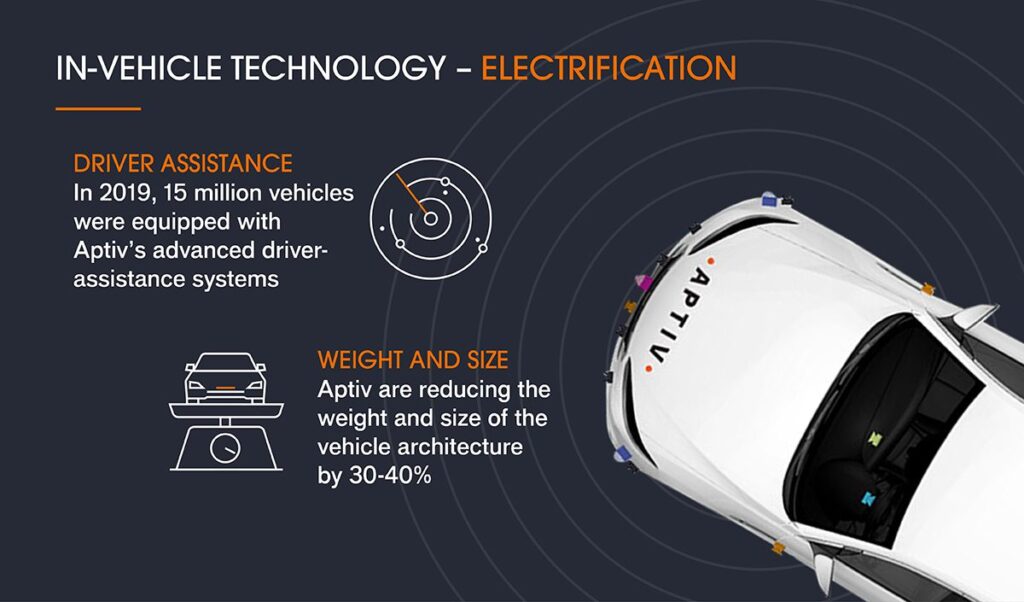While new technology developed by the automotive industry has made modern vehicles safer, more efficient and more environmentally sustainable than ever before, efforts to improve road safety and to reduce the number of road traffic deaths and injuries are still needed.
Aptiv is a global leader in the automotive technology industry, and believes that ‘active safety’ plays a crucial role in preventing road traffic accidents. From its headquarters in North America, Aptiv is delivering mobility technologies, such as radar sensors, driver assistance and automated driving options, that are designed to better connect drivers with their vehicles and surroundings, and to make roads safer for all users.
Cleaner transport
Sustainability is another important area for Aptiv, particularly given its involvement in the automobile industry, which is considered to be one of the most significant contributors to air pollution. According to the WHO, air pollution kills an estimated seven million people each year.1
The European Environment Agency (EEA) has shown air pollution is a major cause of premature death and disease, and is now the single largest environmental health risk in Europe. In 2018, an estimated 379,000 premature deaths resulted from exposure to air pollution.2 Chronic exposure can affect every organ in the body, complicating and exacerbating existing health conditions, ranging from irritation of the eyes and nose to cardiovascular disease.
The health risks associated with air pollution are starting to get more widespread recognition. In April 2021, Ella Adoo-Kissi-Debrah, who died at just nine years old, was the first person in the UK to have air pollution listed as the cause of death on their death certificate, which prompted calls for the UK government to bring legally binding targets for air pollution in line with WHO guidelines.3
As a global technology leader working in close partnership with some of the world’s largest automobile manufacturers, Aptiv is responding to regulatory change by helping to make vehicles greener, as well as reducing their total lifecyle impact on the environment.
Reducing vehicle weight
Another aspect of making the automotive industry more sustainable involves reducing the weight of vehicles. Weight contributes to the fuel use and carbon emissions produced by each vehicle. The European Commission has stated that reducing a car’s weight by 100 kg leads to a reduction in CO2 emissions of 7.6g/km.4
The packaging of Aptiv’s high voltage electrification solutions (wiring harnesses, connectors, electrical centres and cable management) can help to reduce the weight and size of the vehicle architecture by 30-40%. This can save its original equipment manufacturer (OEM) customers to reduce the weight of their vehicles, make considerable savings on investment, while also boosting the environmental performance (and reducing the emissions) of their vehicles.
Recycling
Some of Aptiv’s manufacturing processes generate scrap plastic, so it is now reusing up to 20% of re-grinded material. Aptiv is also having discussions with some of its customers to increase its 20% recycled material threshold, but without compromising the integrity or safety of its products. Therefore, this improvement is likely to take time.
Electrification
Aptiv’s strategy involves the design of products that enable the electrification of transport. By 2040, more than half of all passenger vehicles sold will be electric.5 With more than 20 years of expertise in automotive-grade high-voltage electric solutions, Aptiv is well positioned to serve the automobile industry with both vehicle architecture systems and electrical distribution systems for future generations of electrified vehicles.

Footnotes:
1 World Health Organization, “Health topics – Air pollution”, [Accessed 19 July 2021].
2 European Environment Agency, “Air pollution: how it affects our health”, 14 December 2020 [Accessed 19 July 2021].
3 BBC News, “Air pollution: Coroner calls for law change after Ella Adoo-Kissi-Debrah’s death”, 21 April 2020 [Accessed 19 July 2021].
4 European Federation for Transport and Environment, “Weight-based standards make CO2 targets harder to reach,” European Federation for Transport and Environment, 2008.
5 CNN, “By 2040, more than half of new cars will be electric”, 6 September, 2019 [Accessed 19 July 2021].
These are the views of the author at the time of publication and may differ from the views of other individuals/teams at Janus Henderson Investors. Any securities, funds, sectors and indices mentioned within this article do not constitute or form part of any offer or solicitation to buy or sell them.
Past performance is not a guide to future performance. The value of an investment and the income from it can fall as well as rise and you may not get back the amount originally invested.
The information in this article does not qualify as an investment recommendation.

